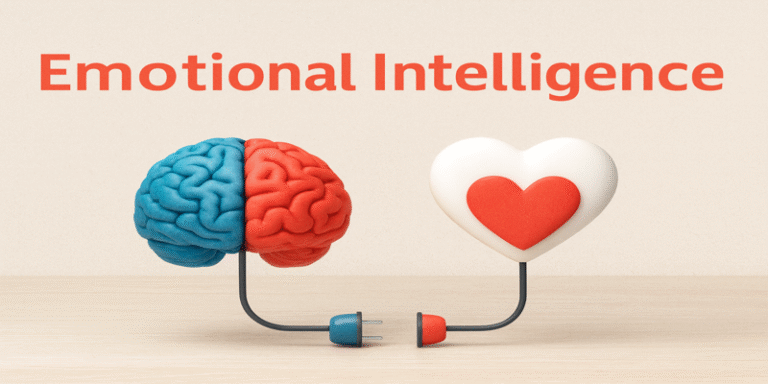In modern organisations, emotional intelligence (EI) has emerged as a critical determinant of individual and collective success. Coined by Daniel Goleman (1995), emotional intelligence encompasses the ability to recognise, understand, and manage one’s own emotions and those of others. The infographic titled “15 Signs of High Emotional Intelligence” highlights core attributes—such as self-motivation, empathy, stress management, and effective communication—that underpin emotionally intelligent behaviour. This article explores these qualities through the lens of leadership, teamwork, and organisational performance, drawing upon scholarly research, psychological theory, and workplace examples.
Understanding Emotional Intelligence
Goleman (1995) identified five domains of emotional intelligence: self-awareness, self-regulation, motivation, empathy, and social skills. Each domain contributes to how individuals navigate interpersonal relationships and adapt to challenges. Salovey and Mayer (1990), who first conceptualised EI, described it as a subset of social intelligence involving the ability to monitor and differentiate one’s emotions to guide thinking and action.
In the context of the workplace, emotional intelligence enhances decision-making, conflict resolution, and employee engagement (Dimitrova & Tomova, 2025). Research consistently shows that EI is a stronger predictor of leadership effectiveness than IQ or technical competence (Goleman, Boyatzis & McKee, 2013).
Key Signs of High Emotional Intelligence
1.0 Self-Awareness and Self-Motivation
Self-awareness—the foundation of emotional intelligence—involves recognising one’s strengths, weaknesses, and emotional triggers. According to Goleman (1998), self-aware individuals possess an accurate sense of their abilities, allowing them to make informed decisions and respond to criticism constructively. The infographic lists self-motivation as another key trait. Self-motivated individuals maintain enthusiasm and persistence even in challenging circumstances.
For example, Satya Nadella, CEO of Microsoft, demonstrated profound self-awareness and motivation when he shifted Microsoft’s corporate culture from a “know-it-all” to a “learn-it-all” mindset, prioritising empathy and growth (Gallo, 2022). This transformation illustrates how emotionally intelligent leadership can reshape an entire organisation’s ethos.
2.0 Managing Stress and Staying Calm Under Pressure
The ability to remain calm under pressure is a hallmark of emotional stability. Dimitrova and Tomova (2025) found that emotionally intelligent individuals experience lower stress levels and are better able to recover from setbacks due to their enhanced emotional regulation skills.
This is particularly relevant in healthcare and high-stakes professions, where leaders must manage crises without succumbing to emotional exhaustion. Hearld et al. (2025) emphasised that leaders with high EI use empathy and composure to stabilise team morale during stressful events—qualities essential in contemporary healthcare and corporate management.
3.0 Handling Criticism and Providing Feedback
Another sign of emotional intelligence is the capacity to handle criticism constructively and provide feedback effectively. Emotionally intelligent employees separate personal feelings from professional advice, enabling them to process feedback as a tool for growth.
Similarly, emotionally intelligent leaders deliver feedback empathetically, balancing honesty with sensitivity. As Cherniss (2010) argues, emotionally attuned feedback strengthens trust and enhances performance by aligning individual goals with organisational objectives.
For instance, at Google, managers are trained to provide feedback framed around growth and future improvement rather than fault-finding, reflecting the company’s emotionally intelligent culture (Schmidt & Rosenberg, 2014).
4.0 Empathy and Understanding Others’ Perspectives
Empathy, the capacity to perceive and relate to others’ emotions, is one of the most defining traits of emotionally intelligent individuals. Empathetic leaders create psychologically safe workplaces, where employees feel valued and understood.
Research by Boyatzis et al. (2017) shows that empathy facilitates better teamwork, conflict resolution, and employee satisfaction. In multicultural teams, empathy is especially important for navigating cultural differences and fostering inclusivity (Dimitrova & Tomova, 2025).
An illustrative case is Jacinda Ardern, former Prime Minister of New Zealand, whose empathetic response to the 2019 Christchurch tragedy demonstrated exceptional emotional intelligence, earning her global respect and reinforcing national unity.
5.0 Communication and Active Listening
The infographic highlights clarity in communication and being a good listener as core attributes. Effective communicators articulate thoughts with precision and adapt their tone according to the context. Moreover, active listening—listening with intent rather than waiting to respond—enhances understanding and reduces workplace misunderstandings (Hearld et al., 2025).
According to Goleman (2013), emotionally intelligent communicators not only convey ideas but also read non-verbal cues and emotional undertones, making interactions more meaningful. In modern organisations, where hybrid work environments have limited face-to-face communication, this skill has become increasingly vital.
6.0 Building Networks and Managing Relationships
High emotional intelligence also manifests in the ability to create and maintain networks. Relationship management involves nurturing trust, cooperation, and mutual respect. Goleman (2011) notes that such individuals are adept at both influencing and inspiring others without manipulation.
This skill correlates strongly with transformational leadership, where leaders motivate followers by aligning them with a shared vision (Bass & Riggio, 2006). Leaders with strong EI cultivate a workplace culture based on empathy, collaboration, and inclusivity—factors linked to higher innovation and reduced turnover (Dimitrova & Tomova, 2025).
7.0 Honesty, Transparency, and Authenticity
Integrity and authenticity are central to emotional intelligence. Emotionally intelligent people are honest and transparent, which fosters psychological safety and trust within teams. According to Cherniss and Goleman (2001), authentic leadership—where leaders act consistently with their values and communicate truthfully—enhances organisational resilience and employee engagement.
An example of such authenticity is Howard Schultz, former CEO of Starbucks, who emphasised openness about challenges faced by the company, reinforcing trust among stakeholders (Schultz, 2019).
8.0 Motivating Others and Sharing Concerns
Emotionally intelligent leaders not only motivate themselves but also inspire others. They communicate a compelling vision that aligns team efforts with organisational goals. Research by Boyatzis and McKee (2013) found that leaders who combine optimism with empathy evoke positive emotional contagion, resulting in improved morale and performance.
Moreover, the ability to share worries and concerns without fear reflects emotional openness, which encourages collective problem-solving and reduces emotional burnout. In organisations like Unilever, leaders are trained to practice “compassionate listening” to foster transparency and employee well-being (Unilever, 2022).
Emotional Intelligence and Organisational Success
High emotional intelligence contributes to several organisational outcomes. Studies reveal that teams with emotionally intelligent leaders experience greater cohesion, lower conflict, and enhanced innovation (Goleman et al., 2013). Moreover, EI positively influences customer relations, change management, and employee retention (Dimitrova & Tomova, 2025).
The World Economic Forum (2023) listed emotional intelligence as one of the top ten skills of the future, citing its relevance in navigating automation, hybrid work, and globalisation. As workplaces evolve, emotionally intelligent employees will be instrumental in fostering adaptability, empathy, and resilience.
Emotional intelligence is far more than a “soft skill”—it is a strategic asset that shapes leadership effectiveness, team collaboration, and organisational culture. The 15 signs of high emotional intelligence, as illustrated in the infographic, encapsulate a holistic framework for personal and professional growth. Whether it is managing stress, communicating clearly, or understanding others’ perspectives, emotionally intelligent individuals elevate not only their performance but also the collective well-being of their workplace.
In an era defined by complexity and change, organisations that cultivate emotional intelligence at every level—through leadership training, feedback culture, and empathy-driven management—will thrive both ethically and economically.
References
Bass, B.M. & Riggio, R.E. (2006) Transformational Leadership. 2nd ed. Mahwah, NJ: Lawrence Erlbaum Associates.
Boyatzis, R.E., Goleman, D. & McKee, A. (2013) Primal Leadership: Unleashing the Power of Emotional Intelligence. Harvard Business Press.
Boyatzis, R.E. et al. (2017) ‘Developing Emotional Intelligence Competencies in Teams,’ Frontiers in Psychology, 8, 1539.
Cherniss, C. (2010) Emotional Intelligence: New Insights and Applications. San Francisco: Jossey-Bass.
Cherniss, C. & Goleman, D. (2001) The Emotionally Intelligent Workplace. San Francisco: Jossey-Bass.
Dimitrova, B. & Tomova, T. (2025) ‘A Wellness Lifestyle, Emotional Intelligence, Workplace and Leadership Success,’ International Journal of Organisational Wellbeing, 12(3), pp. 51–57.
Gallo, C. (2022) The Bezos Blueprint: Communication Secrets of the World’s Greatest Salesman. Pan Macmillan.
Goleman, D. (1995) Emotional Intelligence: Why It Can Matter More Than IQ. New York: Bantam Books.
Hearld, L. et al. (2025) ‘Leading with Soft Skills,’ Health Care Management Review, 50(1), pp. 3–5.
Salovey, P. & Mayer, J.D. (1990) ‘Emotional Intelligence,’ Imagination, Cognition and Personality, 9(3), pp. 185–211.
Schmidt, E. & Rosenberg, J. (2014) How Google Works. Grand Central Publishing.
Schultz, H. (2019) From the Ground Up: A Journey to Reimagine the Promise of America. Random House.
Unilever (2022) Compassionate Leadership and Psychological Safety at Work. [Online] Available at: [https://www.unilever.com] (Accessed: 7 October 2025).
World Economic Forum (2023) The Future of Jobs Report 2023. Geneva: WEF.









